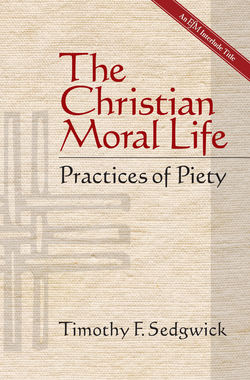The Christian Moral Life

Описание книги
This book, a re-issue of the 1999 edition, demonstrates that the way of life we call Christian is lived in relationships to others. Christian faith, understood as practical piety, calls for a life opened to the world at large, concerned for the «stranger» as well as for the neighbor. Sedgwick further emphasizes that the Christian life is grounded in the experience and worship of God. His work thus develops Christian ethics as «sacramental ethics,» an ethic that has at its center a deepening encounter with God.
Written in a style accessible to non-specialists, this book provides teachers, pastors, counselors, and general readers with an ideal introduction to Christian ethics. It renews the topic of Christian ethics by showing readers that faithful moral living is achieved through the daily practices of grace and godliness.
The author first explores the foundations of Christian ethics as seen by both Catholics and Protestants, and then develops a constructive view of morality as a way of life. Taking into account the central themes of Christian ethics, he shows that effective piety is built on spiritual disciplines that deepen our experience of God: prayer, worship, self examination, simplicity, and acts of hospitality.
Оглавление
Timothy F. Sedgwick. The Christian Moral Life
The Christian Moral Life
Contents
Preface to the 2008 Edition
Introduction
[CHAPTER 1] Describing the Christian Life
Changing Understandings
A Life Given in Worship
Roman Catholic and Protestant Perspectives
[CHAPTER 2] An Anglican Perspective
Faith as a Way of Life
The Theological Tradition
Theology and Ethics
[CHAPTER 3] Incarnate Love
The Transformation of Sexuality
Idolatry and Moralismi
The Covenant of Hospitality
[CHAPTER 4] Love and Justice
The Transformation of Poverty
The Nature of Justice
Law and Gospel
[CHAPTER 5] The Practices of Faith
Disciplines of Mind and Body
Worship and the Disciplines of Faith
Hospitality and Forgiveness
[CHAPTER 6] The Call of God
The Nature of Calling
The Faith of Piety
Ethics and the Christian Life
Appendix
Theology as Grounded in Piety
Narrative Theology and Practice
Understandings of God
Index
Отрывок из книги
Practices of Piety
Timothy F. Sedgwick
.....
These three theological virtues are integrally related. There is no knowledge of God except knowledge born in relationship to God. Faith arises from the experience of being loved; hence faith is a matter of love. In turn, love is not simply a feeling but is a relationship to what is ultimately good. Love is grounded in what is trustworthy. Love is a matter of faith. Hope also is grounded in faith and love, just as there is no faith and love apart from hope. Together, faith, hope, and love give expression to the experience of God as acting upon us and changing us. As such they are virtues. They perfect the human power and capacity to act. Because they first arise from the experience of God as acting upon us, they are called supernatural virtues. They do not arise from making sense of life in general or from human effort and achievement. They are not in this sense ideals to be achieved. Instead, they are gifts from God. They are not matters of human work but matters of divine grace. As such, they come from the concrete experience of God that forms Christians in relationship to God. Central to this formation is worship and specifically the Eucharist.
Protestant thinkers shared Roman Catholic understandings that the moral life was given in the grace of God. They also emphasized the centrality of worship. What they rejected was what they judged as a narrow focus on human action. While Roman Catholic accounts of Christian faith and the moral life began with an emphasis on grace, the focus of moral theology emphasized the criteria by which to assess the goodness of human action and make judgments regarding specific cases. Protestants saw in this focus — even more so in this practice than in the written texts themselves — an undue emphasis on individual guilt and on the religious acts that should be undertaken as a remedy to sin. As Martin Luther concluded from his experience as a Roman Catholic monk, this focus on sinful acts and religious duties led to a preoccupation with oneself instead of leading to the new world of grace revealed in Jesus Christ.
.....
